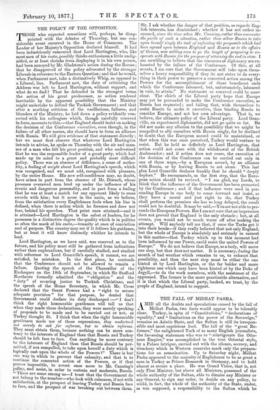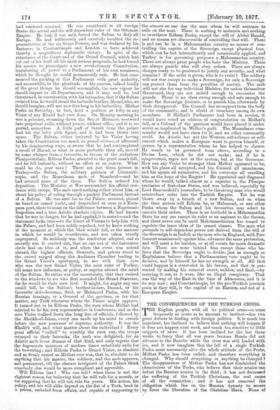THE FALL OF MIDHAT PASHA.
AMID all the doubts and speculations caused by the fall of Midhat Pasha, two facts would appear to be tolerably clear. Turkey, in spite of "Constitutions," "declarations of equality," and "limitations on the power of the Sovereign," remains an Asiatic State, and the Sultan is still its irrespon- sible and most capricious lord. The fall of the "great Re- former," the enlightened Turk of so many English journalists, the far-seeing statesman who was to "reinvigorate the Otto- man Empire," was accomplished in the true Oriental style, by a Palace intrigue, carried out with the silence, secrecy, and treachery which in Western countries mark only the prepara- tions for an assassination. Up to Saturday night, Midhat Pasha appeared to the majority of Englishmen to be as great a man in Turkey as Prince Bismarck in Germany, and to hold almost as secure a place. He was Grand Vizier, that is, not only First Minister, but above all Ministers, possessed of the whole authority of the Sultan, able to dismiss any Minister or any General, to sign any order, to decide on any policy, to wield, in fact, the whole of the authority of the State, under, as was supposed, a responsibility to the Sultan which he had rendered nominal. He was considered in all foreign States the actual and the self-dependent ruler of the Ottoman Empire. He had, it was said, forced the Sultan to defy all Europe. He had deliberately and. carefully insulted the re- presentatives of the six Great Powers, and was declared by his flatterers in Constantinople and London to have achieved thereby a magnificent diplomatic victory. In spite of the reluctance of the Court and of the Grand Council, which had cu% out of his draft all his most serious proposals, he had forced his master to promulgate a new revolutionary Constitution, transferring all power to a Parliament of his own nominees, which he thought he could permanently rule. He had com- menced the packing of this Parliament with great audacity, and meanwhile, in the plenitude of his success, talked loudly of the great things he should accomplish, the new vigour he should impart to all Departments, and it may well be, had threatened, in conversation with his intimates, that if the Sultan resisted him he would recall the imbecilebrother, Murad,who, we should imagine, will not now live long in his imbecility. Midhat Pasha on Saturday, in fact, held a position as lofty as any Vizier of any Khalif had ever done. On Monday morning he was a prisoner, steaming down the Sea of Marmora westward into perpetual exile, without power, without office, and it is re- ported, moneyless. A little puff of breath from the palace had hit the lofty pith figure, and it had been blown into space. The Sultan, either irritated by his Vizier having taken the Constitution too much au grand serieux, or affronted by his domineering ways, or aware that he had contemplated a recall of Murad, or what is more probable than all, moved by some whisper from a favourite, in favour of the audacious Plenipotentiary, Edhem Pasha, assented to the great man's fall, and he fell instantly, without an effort or an outcry. What could he do, poor man ? There are just three powers in Turkey—the Sultan, the military garrison of Constanti- nople, and the Mussulrnan mob of Stamboul—and he had secured none of the three. The Sultan ordered his deposition. The Minister at Wax surrounded his official resi- dence with troops. The mob cared nothing either about him, or about his policy of ruling through a packed Parliament instead of a Sultan. He was sent for to the Palace, arrested, placed on board an armed yacht, and despatched at once to a Euro- pean port, there to muse on the difference between a Napoleonic despotism and a true Asiatic absolute re'ginie. He had known that he was in danger, for he had applied, it is stated—and the statement looks true—to the Court of Vienna to help him with the Palace, and had been coldly repulsed, but he knew nothing of the moment at which the blow would fall, or the manner in which he would be overthrown, and was taken utterly unprepared. So suddenly was the resolution adopted, and so secretly was it carried out, that no one out of the innermost circle had an idea of it, and when the event was noised abroad, the highest officials, Generals, and priests stood in the crowd ranged along the Audience Chamber leading to the Grand Vizier's apartment, to see with their eyes who was the new Grand Vizier, the next ruler of Turkey, till some new influence, or policy, or caprice altered the mind of the Sultan. So entire was the uncertainty, that they rushed to the windows to see who first ascended the Grand Staircase, for he would be their new lord. It might, for aught any one could tell, be the Sultan's brother-in-law, Darned, or his favourite aide-de-camp, Said, or Mahmoud Pasha, with his Russian leanings, or a General of the garrison, or for that matter, any Turk whatever whom the Palace might approve. It turned out to be Edhem Pasha, the man whom Midhat had selected to be his own representative in Conference, and as the new Vizier walked down the long line of officials, followed by the Sheikh-ul-Islam, every one made up his mind to crouch before the new possessor of supreme authority. It was the lthalif's will, and what matter about the individual ? Every great official " called " to worship the risen sun, the troops returned to their barracks, the mob was delighted, for an Asiatic mob loves dramas of that kind, and only regrets that the degenerate manners of modern times substitute exile for the bowstring; and Edhem Pasha is Grand Vizier, as absolute and as firmly seated as Midhat ever was, that is, absolute to do anything that his master, the soldiery, and the mob approve, and permanent, till the obscure intriguers of the Palace think somebody else would be more compliant and agreeable.
Will Edhem last? Who can tell? when there is not the slightest reason for believing that he will rule for a month, or for supposing that he will not rule for years. His action, his po]icy, and his will alike depend on the fiat of a Turk, bred in a prison, secluded from affairs, and capable of supporting to
the utmost on one day the man whom he will sentence to exile on the next. There is nothing to maintain and nothing to overthrow Edhem Pasha, except the will of Abdul Harald, and no means yet discoverable of controlling that will. There is and can be in a Mahommedan country no means of con- trolling the caprice of the Sovereign except physical fear, which can be but intermittently and occasionally applied, and Turkey is for governing purposes a Mahommedan country. There are always great people who hate the Minister. There are always guards who will obey orders. There are always charges ready to be produced to justify any severity, and what remains If the order is given, who is to resist? The soldiery will not rise except to make a Sovereign, for only a Sovereign can protect them from the penalties of mutiny. The mob will not rise for any individual Minister, for unless themselves threatened, they are not united enough to - encounter the guards. There is no class strong enough and safe enough to make the Sovereign hesitate, or to punish him afterwards by their disapproval. The Council has no support from the body of the community, and is afraid of treachery among its own members. If Midhat's Parliament had been in session, it would have voted an address of congratulation on Midhat's fall, or a Colonel of the garrison would have placed it under arrest as implicated in Midhat's guilt. The Mussulman com- munity would not have risen for it, and no other community could. An Asiatic has not the Western self-reliance or self- conceit which makes a European want to govern himself, or govern by a representative whom he has helped to choose. He wants to be governed from above, according to a Divine Law, which he did not make ; and if he is misgoverned, rages not at the system, but at the Governor. How can any Vizier be stronger than Midhat appeared to be, with his plans all accepted, and his Council all unanimous, and his agents all submissive, and his entourage all extolling him as the hope of the Empire ? He appointed and disgraced whom he would, talked almost as a superior to the Plenipo- tentiaries of first-class States, and was believed, especially by Lord Beaconsfield's journalists, to be the strong man who would reintroduce order into the Turkish Empire. Yet he was blown away by a breath of a new Sultan, and so when the time arrives will Edhem be, or Mahmoud, or any other Pasha whom the Sultan and his favourites may select to execute their orders. There is no foothold in a Mahommedan State for any one except its ruler or an aspirant to the throne, and there never can be until Mahommedanism has ceased to regulate the inner ideas of its armed classes. The man who pretends to sell-dependent power not derived from the will of the Sovereign is as foolish as the man who in England, with Par- liament unanimously against him, advances the same pretension, and will meet a far harsher, or at all events far more dramatic fate. There are none behind him except those who be- lieve that the Sovereign ought to decide, just as strongly as Englishmen believe that a Parliamentary vote ought to be decisive, and by himself he has no strength at all. All that could happen is a street-riot in his favour, and that is pre- vented by making his removal secret, sudden, and final,—by carrying it out, as it were, like an illegal conspiracy. That was the way of the East in the time of Ahasuerus, and it is its way now ; and Constantinople, let the pro-Turkish journals prate as they will, is the capital of an Eastern, and not of a European Empire.



































 Previous page
Previous page